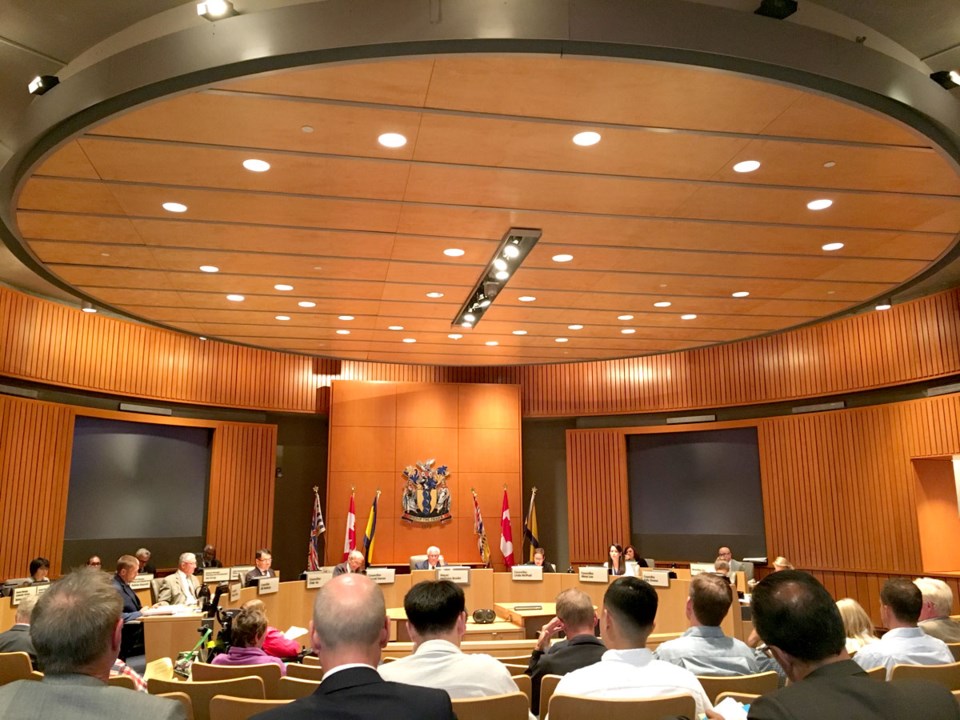Richmond council passed the city’s first homelessness strategy in 17 years, but not without public criticism and last-minute wordsmithing.
De Whalen with the Richmond Poverty Reduction Committee addressed council on Monday before the strategy was debated by council. She focused her criticism on four areas: seniors, outreach work, faith communities and the involvement of people with lived experience.
Whalen advocated drawing on the experiences of those who have been homeless, adding that it can’t be assumed that service providers have this expertise.
“People with lived experience are the experts in their own lives and should sit at tables making decisions about them,” she told council. “Unless they are included, these folks will continue to say ‘nothing about us without us.’”
She also pointed out seniors are the fastest growing demographic group falling into homelessness and that faith communities should be invited to advise on prevention and solutions to homelessness.
The homeless strategy’s vision statement is: “By 2029, homelessness in Richmond will be rare, brief and non-recurring.”
There are five strategic directions in the document: prevention, support for those who are homeless, pathways out of homelessness, collaboration and capacity-building among community partners and to communicate, research and monitor homelessness.
Recent data shows at least 193 people experienced homelessness in Richmond between June 2018 and April 2019. In addition, some low-income households are experiencing instability in their housing situation with some at risk of eviction.
While all council members supported the strategy, some last-minute word changes suggested by Coun. Carol Day sparked discussions regarding the involvement of people with lived experience and support for community groups already helping vulnerable people.
Coun. Carol Day suggested taking out the words “when appropriate” from a backgrounder about engaging people with lived experience when the city creates policies and programs to address homelessness.
“That’s not good enough – I think we need to always engage with people who have lived experience,” Day said.
She also wanted to add the word “support” in front of the heading “Non-Profit, Social Service and Faith-Based Organizations” to indicate the city is committed to supporting the work done by these groups to help vulnerable people.
“Everything that these groups are doing is just so far beyond critical, it’s acute,” Day said.
Mayor Malcolm Brodie argued that the strategy is in the context of other reports and strategies and didn’t feel this minor change would make a difference.
“I’m not seeing the need to put in the word ‘support’ as one word in a very long report which, in my humble opinion, isn’t going to change anything,” Brodie said.
He also felt the wording was correct when discussing the involvement of people with lived experience, and didn’t agree the words “when appropriate” should be taken out.
“If it’s not appropriate, this group doesn’t have a voice in every single thing – they have a voice when it’s appropriate in the implied sense of the word,” Brodie said.
Coun. Linda McPhail argued against the amendments, saying the city’s role to facilitate and support non-profits and faith groups is evident throughout the document.
She added that while the city wants input from people who have been homeless, and their perspective is important.
“Not all situations are appropriate for vulnerable people, and we have to be respectful of that,” McPhail added. “So, I think the wording that’s in our document tonight is appropriate.”
Coun. Bill McNulty suggested referring these two items back to staff to get the correct wording, rather than patching it “on the fly.”
“I’m not a wordsmith at 8:30 at night,” McNulty said.
Coun. Alexa Loo argued against the referral, pointing out the draft strategy came to council already in the spring.
“So if you haven’t figured out the wording and suddenly you want to change a couple of words, it’s ridiculous,” she said, adding the document is a “guiding light” for staff and changing a few words won’t change anything significantly.
“If we go down every rabbit hole on every report like this, it’s a bad precedent to set and I think we should just pass the original motion and move along,” she said.
In the end, Day’s amendments were referred back to staff to be reworked, but the homelessness strategy in its entirety was passed by council.
Immediate priorities identified in the staff report are to create a Community Homelessness Table, secure funding from senior levels of government for permanent supportive housing, launch a working group to address youth homelessness and procure permanent space and operating funding for a drop-in program for homeless people or those at risk of homelessness. Other priorities include raising public awareness, using city resources for coordination, for example, for hiring a homelessness services coordinator and planning for an extreme weather response shelter for this winter.
The City of Richmond last created a homelessness strategy in 2002.



